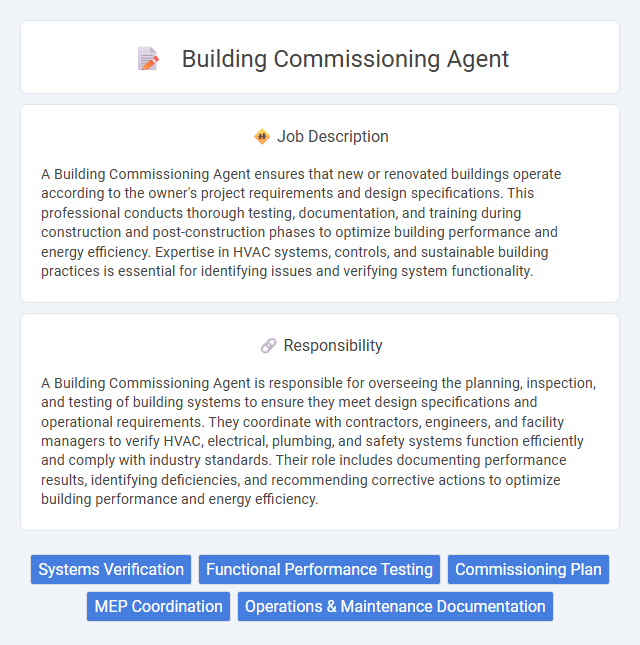
A Building Commissioning Agent ensures that new or renovated buildings operate according to the owner's project requirements and design specifications. This professional conducts thorough testing, documentation, and training during construction and post-construction phases to optimize building performance and energy efficiency. Expertise in HVAC systems, controls, and sustainable building practices is essential for identifying issues and verifying system functionality.
Individuals with strong attention to detail, analytical skills, and a background in engineering or construction are likely to be well-suited for a building commissioning agent role. Those who enjoy problem-solving and working collaboratively with project teams may find this job aligns with their strengths. Conversely, people uncomfortable with technical data or frequent site inspections might face challenges adapting to this position.
Qualification
A Building Commissioning Agent must possess a strong background in mechanical, electrical, or civil engineering, typically holding a bachelor's degree in a related field. Professional certifications such as Certified Commissioning Professional (CCP) or Certified Energy Manager (CEM) are highly valued to demonstrate expertise in system performance verification and energy efficiency. Proven experience in project management, quality assurance, and knowledge of building codes and industry standards like ASHRAE and LEED further qualify candidates for this role.
Responsibility
A Building Commissioning Agent is responsible for overseeing the planning, inspection, and testing of building systems to ensure they meet design specifications and operational requirements. They coordinate with contractors, engineers, and facility managers to verify HVAC, electrical, plumbing, and safety systems function efficiently and comply with industry standards. Their role includes documenting performance results, identifying deficiencies, and recommending corrective actions to optimize building performance and energy efficiency.
Benefit
Hiring a building commissioning agent likely enhances overall building performance by verifying systems are designed, installed, and calibrated correctly. This process probably reduces operational costs and energy consumption through early detection of inefficiencies. Engaging a commissioning agent may also minimize future maintenance issues, leading to long-term savings and improved occupant comfort.
Challenge
The challenge of a Building Commissioning Agent likely centers on coordinating diverse technical teams to ensure all building systems function optimally from design through operation. Navigating complex regulations and identifying system deficiencies before project completion could frequently demand meticulous attention to detail and strong problem-solving skills. Ensuring projects meet energy efficiency and safety standards might require balancing client expectations with practical constraints, making the role both demanding and critical.
Career Advancement
Building commissioning agents play a crucial role in ensuring that HVAC, electrical, and plumbing systems in new or renovated buildings operate efficiently and meet design specifications. Career advancement opportunities include progressing to senior commissioning roles, project management, or specializing in energy management and sustainable building practices. Gaining certifications such as Certified Commissioning Professional (CCP) or LEED Accredited Professional significantly enhances prospects for leadership positions and higher salaries.
Key Terms
Systems Verification
A Building Commissioning Agent specializes in systems verification to ensure all building components function according to design specifications and performance criteria. This role involves rigorous testing and inspection of HVAC, electrical, plumbing, and control systems to confirm operational efficiency and compliance with industry standards. Accurate systems verification by the commissioning agent enhances building performance, reduces operational costs, and supports occupant comfort and safety.
Functional Performance Testing
A Building Commissioning Agent specializes in Functional Performance Testing to ensure HVAC, electrical, and plumbing systems operate according to design specifications and owner's project requirements. This process involves rigorous testing, adjusting, and balancing of systems to verify operational efficiency, energy conservation, and occupant comfort. Expertise in industry standards such as ASHRAE, LEED, and Building Codes is essential for validating system performance and compliance during project completion.
Commissioning Plan
A Building Commissioning Agent develops a detailed Commissioning Plan to ensure all building systems perform according to design specifications and operational requirements. This plan outlines testing procedures, performance verification steps, and key milestones, facilitating coordination among contractors, designers, and owners. Effective commissioning minimizes energy inefficiencies, reduces system errors, and enhances overall building performance and occupant comfort.
MEP Coordination
A Building Commissioning Agent specializing in MEP Coordination ensures that mechanical, electrical, and plumbing systems are designed, installed, and functioning according to project specifications and industry standards. They perform detailed reviews of MEP drawings, conduct system functional tests, and collaborate with contractors and engineers to resolve discrepancies and optimize system performance. Their expertise improves energy efficiency, reduces operational costs, and ensures indoor environmental quality in new construction and renovation projects.
Operations & Maintenance Documentation
A Building Commissioning Agent ensures thorough Operations & Maintenance (O&M) Documentation by verifying all system manuals, equipment data, and maintenance schedules are complete and accurate. They coordinate with contractors to compile detailed O&M binders that facilitate efficient facility management and long-term operational sustainability. Precise documentation supports troubleshooting, preventive maintenance, and regulatory compliance throughout the building lifecycle.
 kuljobs.com
kuljobs.com